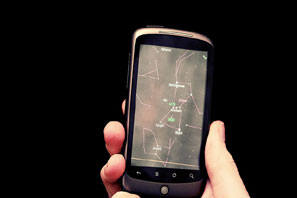
Law enforcement officials in New York and Washington criticized technology superpowers Google and Apple this week for selling cell phones and other devices that cannot be accessed by the government, warning that such technology jeopardizes public safety. In his first major policy address, FBI director James B. Comey called on Congress and the Obama administration to counter the expanding use of such devices, which he and other law enforcement officials assert endanger efforts to prevent terrorism and fight crime. Without lawful government access to cell phones and Internet devices, Comey warned, “homicide cases could be stalled, suspects could walk free, and child exploitation victims might not be identified or recovered.”
Comey, who became FBI director last year, said that he understood Americans’ “justifiable surprise” at former National Security Agency contractor Edward Snowden’s revelations about U.S. government surveillance practices. But Apple and Google’s recent efforts to protect electronic privacy go too far, he maintains. “Perhaps it’s time to suggest that the post-Snowden pendulum has swung too far in one direction—in a direction of fear and mistrust,” he said, speaking at the Brookings Institution in Washington. “Justice may be denied because of a locked phone or an encrypted hard drive.”
Echoing a similar theme at a breakfast forum sponsored by the Manhattan Institute in New York, NYPD commissioner William Bratton and Manhattan district attorney Cyrus Vance, Jr. warned that Google, Apple, and any other company that sells devices that even the product makers cannot access will endanger efforts to prevent crime and terrorism, prosecute criminals, and ensure public safety. “It is outrageous that in the interest of making money, they are thwarting security and crime fighting,” Bratton said, noting that he was especially concerned about the effect of such encrypted devices on his department’s much praised counterterrorism work.
Law enforcement officials have long expressed concern about what Comey calls “going dark”—the proliferation of technology that the government cannot access. But the criticism of Apple and Google by the nation’s chief federal law enforcement official, New York’s most prominent prosecutor, and a veteran police chief who heads the nation’s largest and most sophisticated police force is unusual. Apple and Google’s operating systems run 96.4 percent of smartphones worldwide. Spokesmen for the companies did not respond immediately to requests for comment. But industry and privacy advocates have beaten back earlier efforts by law enforcement officials to secure from Congress legislative “fixes,” as Comey called them in his speech on Thursday.
Speaking on background, a city official said that Vance had not coordinated his criticism of the technology giants with the FBI director or with Bratton. “This is just something that Mr. Vance has felt strongly about for some time,” he said. “So do most people in law enforcement.” In a Washington Post op-ed last month, Vance warned that efforts to assure personal electronic privacy were endangering law enforcement efforts. He called on Apple and Google to stop selling encrypted devices and urged Congress to act if the firms don’t. “This is not a matter of good or bad corporate citizenship,” he wrote. “It is a matter of national public safety.”
Concern in Washington about such technology has been increasing. Comey’s predecessor, Robert Mueller, asked Congress to force communications companies to sell only devices and systems that can comply with a wiretap order to intercept and unscramble encrypted messages. That effort went nowhere on Capitol Hill, and suspicion of government spying soared following Snowden’s revelations. First Apple and then Google announced that they would use encryption on new phones that wouldn’t permit them to help police execute warrants to examine data on a cell phone or other device.
When asked whether such encrypted devices were impeding specific investigations, Vance said that he could not yet identify one. His office, he added, was “closely monitoring” several investigations. Comey repeated his warning that sales of such technology would create what he called a “black hole” for enforcement, depriving investigators of the forensic data needed to solve crimes.
But technology experts have argued that strong default encryption is needed to protect users from unwanted violation of their private data by governments and hackers alike. In a statement yesterday, Nuala O’Connor, president of the Center for Democracy and Technology, defended the encryption of cell phone and other personal communications devices. Law enforcement officials, she said, have “many legitimate ways to obtain the data stored on our devices. Weakening the security of smartphones and trusted communications infrastructure should not be one of them.”